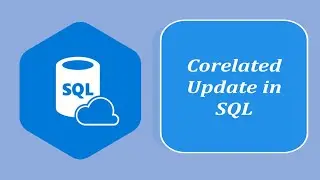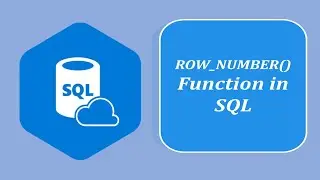SQL Interview Question and Answers | Explain the difference Between Union and Join Operation
"UNION" and "JOIN" are both SQL operations used to work with data in relational databases, but they serve different purposes and have distinct functionalities:
*Join Operation:*
1. *Purpose:*
The "JOIN" operation is used to combine data from two or more related tables based on a common column or set of columns. The primary purpose of a join is to retrieve related information from multiple tables.
2. *Usage:*
A join is used in the "FROM" clause of a SQL query. You specify the tables you want to join and the join condition, which determines how the tables are related.
3. *Result:*
The result of a join is a combined result set that includes columns from all the joined tables. Rows are returned when there is a match based on the join condition.
4. *Types:*
Common types of joins include INNER JOIN (returns only matching rows), LEFT JOIN (returns all rows from the left table and matching rows from the right table), RIGHT JOIN (the opposite of a LEFT JOIN), and FULL JOIN (returns all rows from both tables).
*Union Operation:*
1. *Purpose:*
The "UNION" operation is used to combine the results of two or more SELECT statements into a single result set. It is primarily used to merge data from multiple queries that have the same structure.
2. *Usage:*
The "UNION" operator is used between multiple SELECT statements. Each SELECT statement retrieves data from different tables or conditions, and the "UNION" operator combines their results.
3. *Result:*
The result of a "UNION" operation is a single result set that includes all rows from each SELECT statement. Duplicate rows are eliminated by default, but you can use "UNION ALL" to include duplicates.
4. *Types:*
"UNION" is the standard operation that combines distinct rows from multiple result sets. "UNION ALL" includes all rows, including duplicates.
*Key Differences:*
*Purpose:* A join combines data from multiple tables, whereas a union combines data from multiple SELECT statements.
*Usage:* A join is part of a single SQL query, often used in the "FROM" clause. A union combines the results of separate SELECT statements.
*Result:* A join results in a single result set that combines columns from multiple tables. A union produces a single result set that combines rows from multiple SELECT statements.
*Matching Criteria:* In a join, you specify matching criteria based on common columns. In a union, data from SELECT statements doesn't need to be related; it's combined vertically.
In summary, "JOIN" is used to combine related data from multiple tables, while "UNION" is used to combine the results of multiple SELECT statements, which may or may not be related. The choice between these operations depends on your specific data retrieval needs.
#sql































